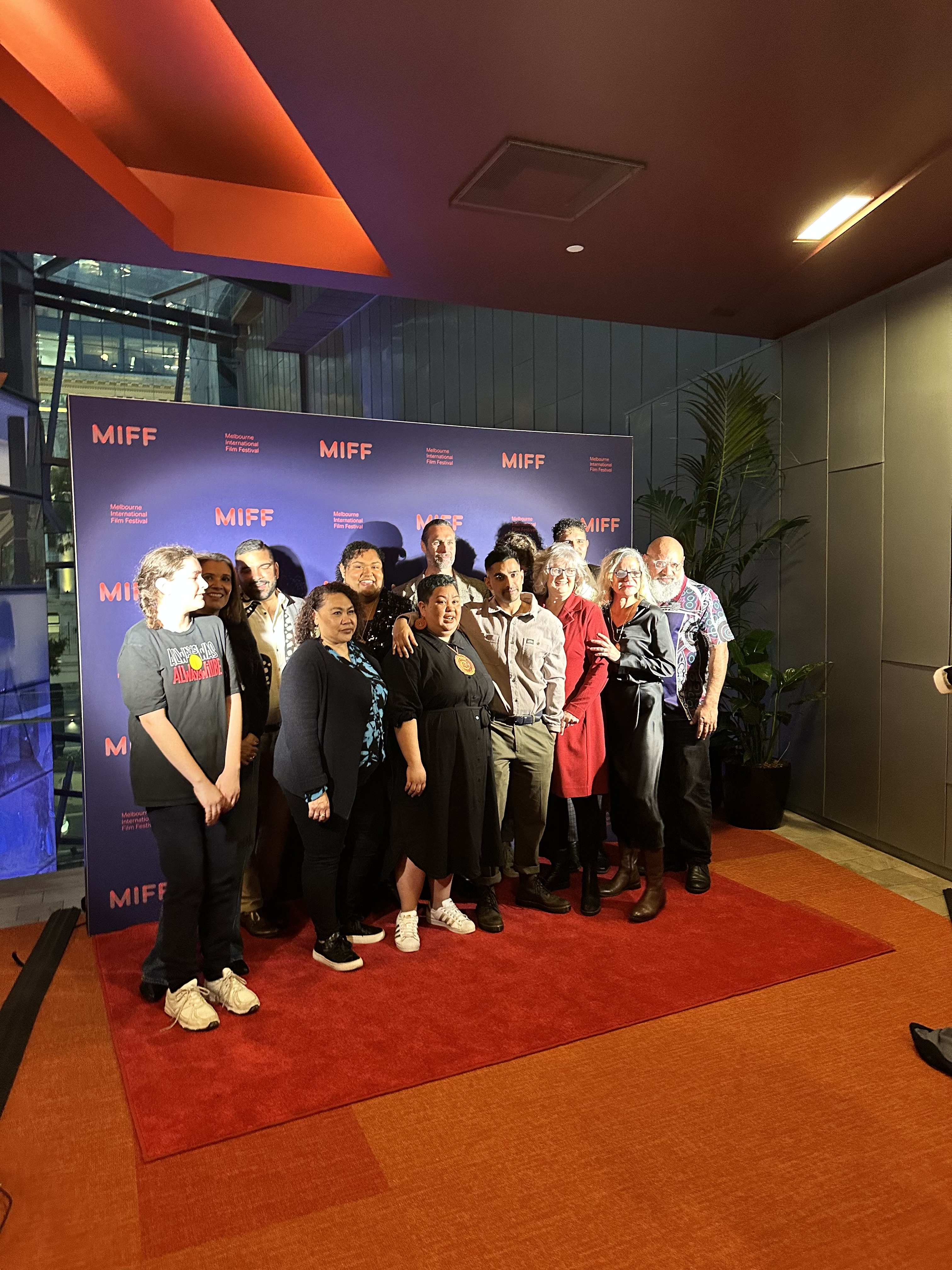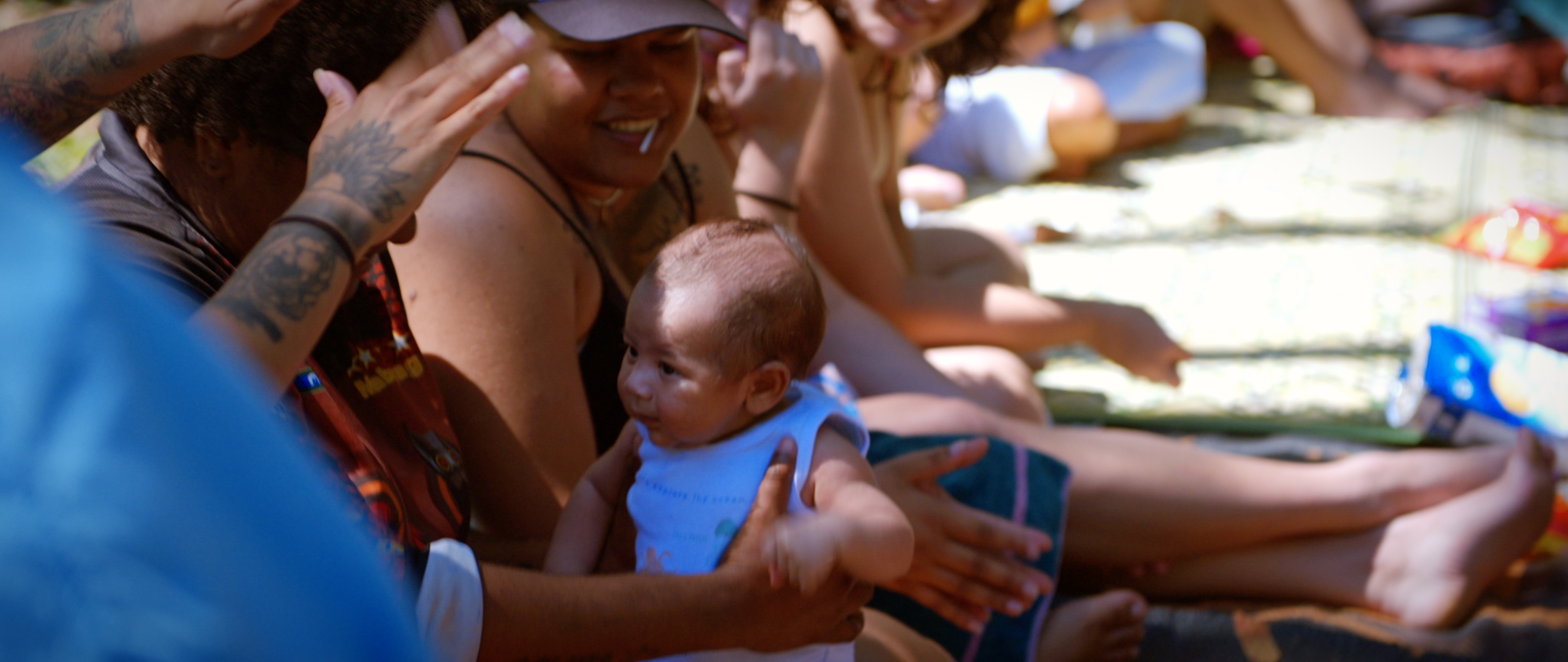As the first anniversary of the 2024 documentary 'VOICE' approaches, its creators reflect on the failed Voice to Parliament referendum and the future of First Nations' constitutional recognition.
It's the day after the 2023 Voice to Parliament referendum result. Australia has voted "No."
On Yidinji and Yirrdandji Country in Queensland, 23 young First Nations referendum campaigners gather in quiet heartbreak. The scene, captured from the 2024 documentary VOICE, is a glimpse into the collective devastation following the referendum result.
Behind the shaky lens of a hand-held camera, their grief is undeniable. One of the volunteers wipes away tears. Another stares at the ground, wordless.
"I honestly thought that we were ready, and that non-First Nations people were ready to accept us, but obviously I was wrong, and it's upsetting," said one volunteer, before cracking a tearful smile.
The result marked a painful resolution to months of campaigning across 3,000 kilometres and through dozens of communities in two packed minibuses.
As part of a pilgrimage to the Gurindji Freedom Day Festival, the group had prepared to join a decade-long campaign advocating for the constitutional recognition of Indigenous Australians - honouring a land rights movement initiated by Gurindji activist and stockman Vincent Lingiari in 1966.
Facilitated by the Indigenous-led, grassroots organisation Deadly Inspiring Youth Doing Good (DIYDG), their mission had been simple yet powerful: to engage communities, open conversations, and advocate for a "Yes" vote.
But history was against them - only eight of 44 referendums had ever succeeded.
On October 14, 2023, Australia made its vote clear - 60.1 per cent of Australians voted "No" to the Voice to Parliament, an advisory body enshrined in the Constitution giving First Nations' communities a route to inform policy and legal decisions that affect their lives.
As the documentary's first anniversary approaches on August 21, the VOICE team is reflecting on the result and the future of First Nations' constitutional recognition.
"We never envisioned that what started as an idea for a Convoy would turn into a fully-fledged documentary," admitted Daniel Rosendale, a Western Kuku Yalanji and Gugu Yimithirr man, DIYDG co-founder, and co-producer of VOICE.
It was when first-time documentary filmmaker Krunal Padhiar was introduced to DIYDG that the project transformed from a grassroots road trip into a documentary.
Released on August 21, 2024, VOICE premiered at the 2024 Melbourne International Film Festival and also featured in the 2024 Hawai'i International Film Festival.
"It shines a light on the indomitable spirit of hope and desire to lead their communities to a better future," reads a synopsis by the Festival.

Co-directed by proud Gudjula, Eastern-Kuku Yalanji and Darnley Island woman and DIYDG's co-founder and former chair, Semara Jose, VOICE tells the story of the people most impacted by the referendum result.
"The referendum was an important part in Australian history, we got to see first hand what was an honest and fair movement in reconciliation and truth telling being weaponised as a political football for hate and division," said Mr Rosendale.
For the DIYDG team, it was crucial to tell the story of the referendum through real First Nations perspectives, rather than letting their voices be sidelined.
"For us, we wanted the stories of the Convoy participants to shine throughout the documentary - when you remove the political noise, that's what the change is all about, actual people and their perspectives," Mr Rosendale said.
"What we wanted to show was that there are real experiences, real lived experiences, real stories happening every day where this movement could have positively affected our community."
.jpg)
Reflecting on the moment he saw the finished documentary, Mr Rosendale described it as "healing".
"There was a lot of emotion at the time, especially the day after sitting there at the creek with all the convoy mob. It was a very emotional day, but seeing it like a year later, when we finally got to see the first draft of the documentary and hear the stories," he said.
"It was a way of actually addressing and reliving that hurt in many ways. But also being able to accept that was a really, really special moment, and one that I was very grateful that I got to do alongside some of the participants of the convoy."
Director and editor of VOICE, Krunal Padhiar, also reflected on the failure of the Voice to Parliament.
"Although the referendum failed, thousands of volunteers participated on a national level for change. I believe this stands as a seed that will continue to be nurtured and evolve through the spirit of the next generation, and the knowledge and wisdom they've imbibed from the past and present," he said.
Dedicated to social impact storytelling, Mr Padhiar took special consideration in making VOICE an authentic portrayal of the First Nations' perspectives involved.
Shot as an observational documentary, the camera rolled continuously for 11 days, capturing unscripted, intimate moments on the road. Carefully crafted sound design and hours of editing also went into the documentary, ensuring the final product reflected the emotional weight of the convoy.
The use of a drone, Mr Padhiar described, was a "key part in capturing symbolic moments of how advocacy begins: a small bus on a country road, with a vision to lead and follow in the footsteps of all those who had walked before them".
.JPG)
For Mr Padhiar, the heart of the documentary was the people and stories involved.
"What helped was not walking in with any grand expectations but being genuinely connected with everyone involved," Mr Padhiar said.
"Even amid uncertainty, the story was organically coming together through the dialogues that were shared, inspired by the national campaign that stood as the backbone of our journey.
"Ultimately, what kept me going was my love for telling the story and the connection to a community whose hard work, sacrifice, and advocacy span generations – it felt sacred."
Despite the outcome, the DIYDG crew is looking back with stronger resolve in 2025. After all, the heart of their convoy hadn't been the referendum; it had been representing real First Nations voices in the ongoing push for constitutional recognition.
"Look, I still think there's hurt within the community, but I also think there's opportunity," said Mr Rosendale.
"We also look at that in the fact that there were over six million people who said yes. We look at the fact that it was the most engaged referendum. We look at the fact that for the first time in years, we've engaged non-Indigenous people on a First Nations issue for the better."

Mr Rosendale remains optimistic about the future of First Nations' political sovereignty, reflecting on VOICE as a symbol of hope.
"I want the documentary to remain as a sense of hope, while the referendum had failed, we managed to cut through and influence millions of people to open up their hearts," he said.
"As a people, we are used to setbacks and rejection from the wider Australia, but as we have always done, and will continue to do, is stand back up and continue to fight for what is right.
"So it's still a journey of hope and one that we will continue to advocate for in the coming years."
Mr Rosendale added that while the movement is political, its foundation is personal and grounded in the strength of First Nations' communities.
"For us, community is everything. So when we hurt, we hurt together - but when we heal, we also heal together," said Mr Rosendale.
"When you're going through hardship and hurt, and you can look around and see: I'm not alone - and I'm going to be okay because of the people around me - that is the innate and special ability that our communities have."
'VOICE' contributors:
Ben Lawrence (Executive Producer), Shannon Wilson-McClinton (Producer), Leeanne Torpey (Impact Producer), Semara Jose (Co-Director, Co-Founder and Former Chair of DIYDG).
Co-Producers: Stacee Ketchell, Merrissa Nona, Manny Williams, Billie-Jade Braund and Nicole Caelli.
Participants: Anna-Rita Fauid, Aunty Joanne Schmider, Dean Parkin, Eric Avery, Hannah Hagan, Laschaya Body, Littiah Billy, Mikayla-Haze Adams, Nick Eakin, Regan Lane, Serena Rae Thompson, Shannon Hagan, Shonteia Warradoo, Thomas Mayo, Trinity Clarke, Tyrese David Sabatino, Vivian Mook, Quitaysha Thompson.
Film team: (Archival Consultant) Naomi J. Hall - Research Engine, (Assistant Camera) Brett Charles, (Colour Grade) Brad Smith, (Key Art) Demi Hopkin - Carnival Studios, (Music) Paul Kelly & Ziggy Ramo, (Music Supervisor) Kate Dean - The SyncHouse, (Sound Producer) Bonnie Law, Nick Keate, Jack Okeby - Heckler Sound
'VOICE' is available to watch on Prime Video and Apple TV.

